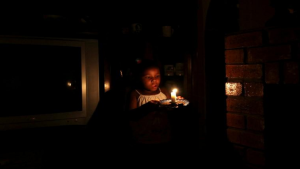A restaurant owner at Nzhelele, outside Louis Trichardt in Limpopo, says his business is on the brink of collapse due to the continued power blackouts. Ranwedzi Mulaudzi says the power cuts have led to a complete closure of some of his restaurants and he’s only surviving on his savings.
The country is currently on stage five of rolling blackouts, which was downgraded from stage six which was implemented over the weekend.
Fifty three-year old Mulaudzi owns a small restaurant at Nzhelele.
He started his business over a decade ago and currently employs five people as permanent employees. Mulaudzi says on a normal day, his business generates enough income to keep it afloat but with rolling blackouts, which also led to President Cyril Ramaphosa to cut short his international trip to the United Nations General Assembly in New York, he is working at a loss.
“This is really affecting us. I feel like crying, because due to load shedding. I am not able to make enough income to take care of my business and family. The banks are always closing due to power cuts, so the social grants recipients who are our target market, are no longer coming to buy, instead, they come to borrow money for transport to return home.”
Mulaudzi says he may have to lay off some workers as he can’t afford to pay salaries.
“I don’t have much left now in my account, if these power cuts don’t stop I will not be able to pay these people. They depend on this business.”
Meanwhile, residents are calling for urgent intervention. They say they are also affected by the power cuts on a daily basis.
“I think it’s time everyone, especially political parties, come together to resolve this matter. It affects all of us and it’s hurting the country. I work at a shop here and this load shedding is killing us. We have to work less than half day and it also affects us in our homes,” says a resident.
Some businesses have already shut their doors or laid off their employees due to the impact of rolling blackouts.
VIDEO | ‘We apologise to the people of South Africa for stage 6 load shedding’: Eskom CEO De Ruyter:
Workers arrive late due to traffic lights not working
Small and medium sized businesses in the service and light industrial sectors along Durban’s North Coast Road are also impacted by power cuts in a wide variety of ways.
Apart from down time when there is no electricity, workers sometimes arrive late because traffic lights are not working.
Orders with large retail chains cannot be met on time and result in penalties or even the cancellation of orders. Depending on the nature of the work, some factories even had to put workers on short time.
Fareed Hassan is the director of a highly automated embroidery factory.
He explains the impact of the outages, “When we have unplanned this is huge because we have machinery that are first highly automated, set pre-configured. And when those machines run and if the power dips slightly or even if it goes off, those machines are now out of synch. And at any one time because we have a huge plant, we have a minimum of 200 parts that’s running across the machines, and all 200 are rejected. So there’s no revenue, there’s liabilities for us as a company because your client doesn’t care. You know it’s something you should resolve.”
Nalini Rampersad says the company where she works pays R100 per hour for electricity, while running the generator costs at least R400 rand per hour.
” Firstly, for my company being wholesale and retail having customers coming in all the time, we had to invest in a generator. Secondly, a generator is not an economical item because it uses petrol to operate,” says Rampersad.
Rolling blackouts affecting plan to double jobs in the clothing industry
The Southern African Clothing and Textile Workers Union (SACTWU) says rolling blackouts including stage five and six has had a negative impact on its members.
SACTWU says its industry master plan which seeks to double the number of jobs both in manufacturing and in retail by year 2030 has also been hampered by the rolling blackouts.
The master plan was signed at the end of 2019 by industry players including unions, government and sector employers.
SACTWU’s Industrial Policy Officer Etienne Vlok says workers are hardest hit.
“What load shedding is doing is undermining that master plan, it does so in a couple of ways, the most important is the interruption of production because it means that our factories are unable to deliver goods at the correct time to the customers in this industry. Doing so it’s extremely important and when this does not happen the customers start looking elsewhere.”
Meanwhile, the City of Cape Town has been able to shield consumers by implementing blackouts by one or two levels lower than the rest of the country through its Steenbras Dam Hydro Pump Storage plant.
Johannesburg commits to alternative supply
The City of Johannesburg has recommitted to seeking alternative energy sources, besides Eskom, as quickly as it can.
The metro says this will help to ensure that services such as water supply, healthcare and sewage are not affected by the rolling blockouts.
Residents of Bosmont, parts of Riverlea and surrounding areas, have been without electricity since Saturday following an explosion at the Industria Power Station as a result of . Roodepoort blackouts. Residents have also been affected after cables at their substation were stolen during power cuts.
City of Johannesburg MMC for Infrastructure, Michael Sun says, “Cables were cut during load shedding. So when you have that kind of damage it inevitably damages the water supply to residents in the area. We cannot sit back and say we cannot do anything. We are looking at rolling projects where we install alternative power supply to the pump stations so that whenever there’s load shedding, these pump stations will still be able to function.”






